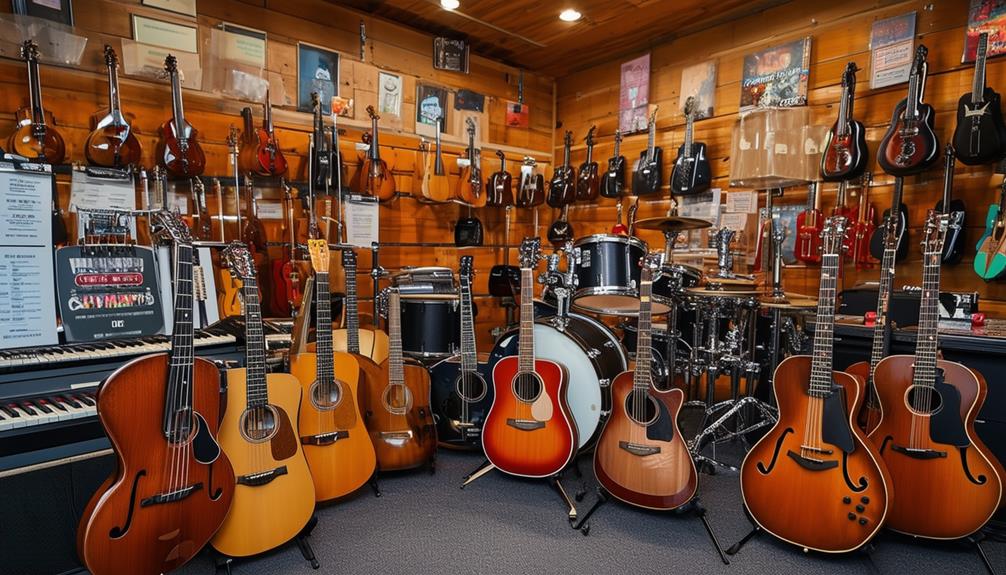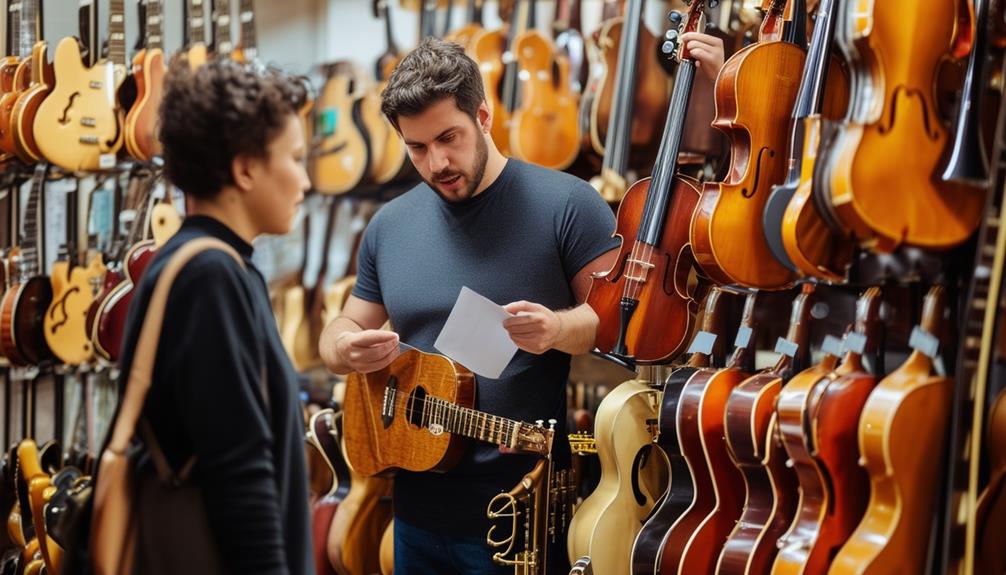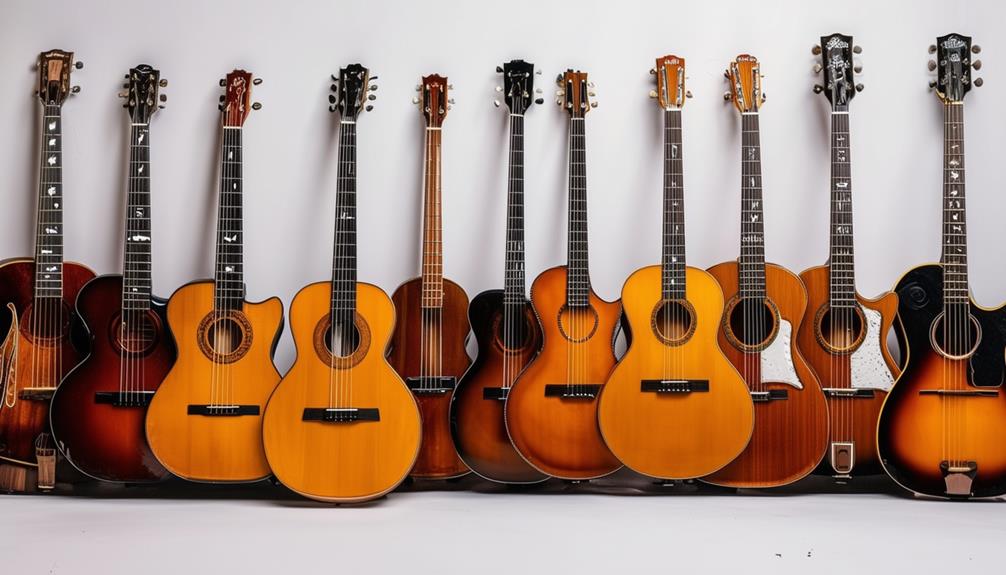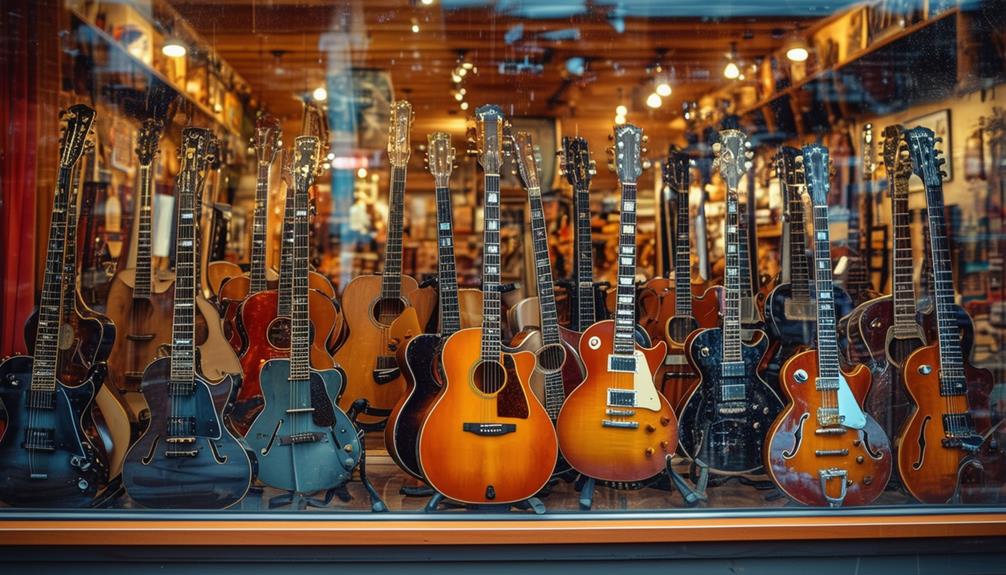Get the Best Deals on Pawned Instruments Today
Get the Best Deals on Pawned Instruments Today
Discover unbeatable offers on pawned instruments today! Maximize your musical potential with high-quality gear at incredible prices. Find vintage guitars, rare violins, and quality brass instruments waiting for you. Learn to negotiate like a pro for even better deals. Prioritize inspecting instruments to guarantee quality. Understand pawn shop policies and authenticate your purchase. Discover how to spot valuable instruments and secure your investment wisely. Start your journey to musical bliss now!
Benefits of Buying Pawned Instruments

Purchasing pawned instruments can offer budget-conscious musicians access to quality musical gear at greatly discounted prices. These instruments provide budget-friendly options for those looking to expand their collection without breaking the bank.
Despite being pre-owned, many pawned instruments come with quality assurance, ensuring that buyers get instruments that are in good working condition. Additionally, buying pawned instruments presents an opportunity for investment potential, as some pieces may appreciate in value over time, especially if they turn out to be vintage finds.
Top Musical Instruments to Look For
When scouting for musical instruments in pawn shops, keep an eye out for the top picks that offer both quality and value for aspiring musicians. Here are some top musical instruments to look for:
- Vintage Guitars: Vintage guitars are not only valuable but also have a unique sound quality that many musicians cherish. They can be a great investment for both playing and collecting.
- Rare Violins: Rare violins are highly sought after by musicians and collectors alike. Their craftsmanship and historical significance often make them valuable pieces that can appreciate over time.
- Quality Brass Instruments: Brass instruments like trumpets, trombones, and saxophones are also worth considering. Look for well-known brands in good condition for a great deal on a quality instrument.
Negotiating Tips for Better Deals

As you search for top musical instruments in pawn shops, honing your negotiation skills can greatly improve your chances of securing better deals. To assist you in this process, here are some key negotiation tips to take into account:
| Negotiation Strategies | Price Comparison | Building Rapport | Finalizing Deals |
|---|---|---|---|
| Research the market value of the instrument. | Compare prices across multiple pawn shops. | Engage in friendly conversation with the seller. | Clearly state your offer and be prepared to counteroffer. |
| Be prepared to walk away if the deal isn't right. | Use online resources to check current prices. | Show genuine interest in the instrument. | Confirm all terms before closing the deal. |
| Highlight any flaws to negotiate a lower price. | Negotiate based on the instrument's condition. | Ask questions about the instrument's history. | Get all agreements in writing for clarity. |
Inspecting Instruments Before Purchase
Before finalizing any transaction, it is crucial to thoroughly examine the quality and condition of the musical instrument you are interested in acquiring. When inspecting instruments before purchase, consider the following:
- Instrument maintenance tips: Look for signs of wear and tear, check for loose or missing parts, and test the functionality of all components to guarantee the instrument is in good working condition.
- Buying used instruments: Inquire about the instrument's history, including how often it was played and if any repairs have been done. This information can help you assess the instrument's overall value and potential longevity.
- Avoiding counterfeit instruments: Verify the authenticity of the instrument by checking for any tell-tale signs of counterfeiting, such as mismatched branding or poor craftsmanship. If in doubt, seek professional advice before making a purchase.
Understanding Pawn Shop Policies

To navigate the process of acquiring musical instruments from pawn shops effectively, understanding their policies is vital for a smooth and satisfactory transaction experience. Pawn shop regulations vary, but most will require you to provide a valid ID, disclose any previous ownership history of the instrument, and agree to the terms of the loan.
Some shops may have specific loan requirements, such as a minimum loan amount or a maximum loan-to-value ratio. It's important to familiarize yourself with these policies before engaging in any transactions to guarantee a seamless process.
Ensuring Authenticity of Instruments
When it comes to purchasing instruments from pawn shops, ensuring authenticity is vital. Authenticity verification methods and consulting trusted instrument appraisers are essential steps in guaranteeing the legitimacy of the instrument.
Authenticity Verification Methods
Ensuring the authenticity of instruments is paramount in the process of verifying their value and quality in the pawn industry. To guarantee the legitimacy of instruments, several methods can be employed:
- Authentication Technology: Utilizing advanced authentication technology can aid in verifying the origin and history of instruments.
- Verification Process: Establishing a rigorous verification process ensures that each instrument is thoroughly examined for authenticity.
- Fraud Prevention and Counterfeit Detection: Implementing measures to prevent fraud and detect counterfeit instruments is essential in maintaining the integrity of pawned items.
Trusted Instrument Appraisers
Trusted instrument appraisers play a vital role in verifying the authenticity of instruments in the pawn industry. Appraiser qualifications are key in this process, as they need to have a deep understanding of various instruments, their history, and market value. These professionals must possess certifications or relevant experience to guarantee accurate assessments.
The appraisal process involves a detailed examination of the instrument, considering factors like brand, condition, age, and any unique features. Appraisers meticulously research comparable sales data to determine a fair market value. Their expertise guarantees that customers receive a reliable assessment of their instruments' worth, giving them confidence when buying or selling pawned items.
Trustworthy appraisers are instrumental in maintaining the integrity of the pawn industry.
How to Spot Quality Instruments

Quality instruments can be identified by their craftsmanship, materials, and overall sound. When spotting quality instruments, pay attention to the following:
- Identifying Craftsmanship: Look for precise and intricate detailing on the instrument. Quality craftsmanship is often evident in smooth finishes, perfectly aligned components, and overall aesthetic appeal.
- Recognizing Quality Materials: Check for the type of wood or metal used in the instrument. High-quality materials such as solid woods for acoustic instruments or durable alloys for wind instruments contribute to better sound quality and durability.
- Assessing Overall Sound: Play the instrument or have someone play it for you. A quality instrument will produce a rich, balanced sound with good projection and resonance.
Knowing the Market Value
Understanding the current market value of pawned instruments is vital for making informed decisions when buying or selling musical gear. To grasp the intricacies of the market, it's important to stay updated on market trends and employ effective pricing strategies. By understanding the value of different instruments, you can negotiate better deals and secure profitable transactions. Here's a simple table to illustrate the significance of market value:
| Instrument | Market Value ($) |
|---|---|
| Electric Guitar | $500 |
| Acoustic Guitar | $300 |
| Drum Set | $700 |
| Keyboard | $400 |
Knowing the market value empowers you to make savvy choices and maximize your investments. Stay informed, analyze pricing strategies, and make the most out of your pawned instrument transactions.
Securing Your Investment

When it comes to securing your investment in pawned instruments, there are key points to keep in mind.
Protecting the value of your instrument, having insurance coverage, and using proper storage techniques are essential.
Protecting Instrument Value
To safeguard the value of your musical instrument investment, it is essential to prioritize proper maintenance and storage practices. Ensuring your instrument remains in top condition will not only maintain its value but also prevent damage that could decrease its worth.
Here are three key tips to help you protect the value of your musical instrument investment:
- Regular Cleaning: Dust and dirt can build up on your instrument, affecting both its appearance and sound quality. Regularly clean your instrument with appropriate tools and products to keep it looking and sounding its best.
- Proper Storage: Store your instrument in a secure, climate-controlled environment to prevent damage from extreme temperatures, humidity, or accidents.
- Professional Maintenance: Schedule regular check-ups and maintenance with a qualified technician to address any issues promptly and keep your instrument in excellent condition.
Insurance for Instruments
Securing insurance for your musical instruments is an important step in protecting your investment and ensuring peace of mind. Instrument insurance provides financial coverage in case of theft, damage, or loss, safeguarding your valuable equipment.
In addition to insurance, regular instrument maintenance is essential to prevent issues that may lead to costly repairs. Proper upkeep not only extends the lifespan of your instruments but also maintains their resale value.
However, despite diligent maintenance, unforeseen damages may occur, requiring professional instrument repair. Having insurance can alleviate the financial burden associated with repairs, giving you the confidence to use your instruments without worry.
Proper Storage Techniques
Proper storage techniques are crucial for safeguarding the value and longevity of your musical instruments. To guarantee your instruments remain in top condition, consider the following tips:
- Proper maintenance: Regularly clean your instruments with appropriate materials to prevent dirt buildup and damage.
- Humidity control: Maintain a stable humidity level in the storage area to prevent warping or cracking of the instrument due to excessive moisture or dryness.
- Proper placement: Store instruments in their cases or on stands designed for their specific shape to prevent accidental damage or falls.
Frequently Asked Questions
Are Pawned Instruments Always in Good Condition?
Pawned instruments may not always be in good condition. Quality assessment is important to determine their state. Factors like maintenance history and previous handling can impact their condition.
Inspection by a professional is recommended before purchase to guarantee good quality. Regular maintenance and proper care influence the overall condition of pawned instruments. It's vital to take these aspects into account to make an informed decision when buying second-hand musical instruments.
Can I Return a Pawned Instrument if I'm Not Satisfied?
When contemplating returning a pawned instrument due to dissatisfaction, it is crucial to review the pawn shop's refund policy. Many pawn shops have strict no-return policies for pawned items.
To guarantee customer satisfaction, some shops may offer a quality assurance guarantee or a return process, albeit with certain conditions. It is advisable to inquire about these terms before finalizing any pawn transactions to avoid any potential issues.
Do Pawn Shops Offer Warranties on Instruments?
Warranty options on instruments provided by pawn shops vary. Some establishments may offer limited guarantees to provide quality assurance for a certain period after purchase. It's recommended to inquire about warranty details before making a purchase.
Understanding the warranty terms can provide peace of mind regarding potential issues that may arise with the instrument. Always clarify warranty options and coverage to make an informed decision when buying from a pawn shop.
What Happens if the Instrument Is Stolen?
If a pawned instrument is stolen, the outcome can vary. Insurance coverage may provide reimbursement, depending on the policy terms. Legal implications come into play, as ownership rights need to be established.
It is essential to report the theft promptly to the authorities and provide any necessary documentation to the pawn shop. Understanding the process and seeking legal advice can help navigate the situation effectively.
Can I Trade in My Old Instrument for a Pawned One?
When considering trading in your old instrument for a pawned one, it's important to explore your trade-in options and understand the value you may receive.
Quality assurance and thorough inspection processes are typically in place to guarantee the instruments offered in exchange are of good quality.
Prioritizing these steps can help you make a confident decision when swapping your old instrument for a pawned one.
Conclusion
To sum up, purchasing pawned instruments can be a treasure hunt for hidden gems. Just like a skilled archaeologist uncovering ancient artifacts, diligent buyers can discover high-quality instruments at affordable prices.
By following the tips provided and conducting thorough research, you can navigate the world of pawn shops with confidence and secure valuable investments for your musical pursuits.
Happy hunting!

